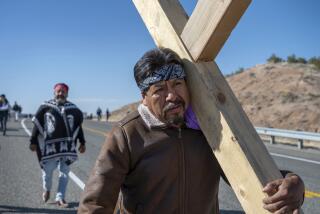Iran to televise two jailed Americans’ confessions
Iran’s state-controlled television aired a short clip Monday touting an upcoming news program that it says will show taped confessions by two Iranian Americans jailed this year on charges of espionage.
One of them, Haleh Esfandiari, 67, looks pale but otherwise healthy, and wears a black chador over all but her face and hands. She is shown in a residential setting, speaking to the camera.
In the video clip shown Monday, she admits to being part of “a velvet revolution in Georgia,” the former Soviet republic in the Caucasus region, and suggests that she had been trying to overthrow the Iranian government, “in the name of dialogue, in the name of women’s rights, in the name of democracy.”
Kian Tajbakhsh, an urban planning expert who worked with George Soros’ Open Society Institute, is shown separately. He appears in khaki pants and reads from a sheet of paper.
The role of “the Soros center after the collapse of communism was to target the Islamic world,” he says in the promo, adding that he had sought to create “a conflict between the government and the people.”
A friend of Tajbakhsh, speaking on condition of anonymity because she frequently travels to Iran, said she was shocked by his appearance.
“He looks 10 years older,” said the friend, who last saw him a year ago.
“He didn’t used to have white hair. Now his head is full of white hair.”
The show, called “In the Name of Democracy,” is to air Wednesday night in Tehran.
Esfandiari, Tajbakhsh and a third Iranian American, Orange County peace activist Ali Shakeri, were swept up by Iranian security forces in a crackdown targeting pillars of Iran’s civil society. Iranian authorities allege that Esfandiari and Tajbakhsh have ties to a U.S.-sponsored plot to overthrow Iran’s regime. Shakeri faces similar allegations.
In a statement released after the airing of the commercial, the Woodrow Wilson International Center for Scholars disputed any confession by Esfandiari, the center’s Middle East program director.
The center says Esfandiari has been held in solitary confinement inside Tehran’s Evin prison since May 8.
“She has seen no one from outside the prison during this time: not her mother, not her family, not her lawyer and not ... any independent international body,” Lee H. Hamilton, president and director of the Woodrow Wilson center, said in the statement. “Any statements she may make without having had access to her lawyer would be coerced and have no legitimacy or standing.”
Monday’s clip evoked chilling reminders of the televised confessions of opponents to the Islamic regime aired during the first years of the 1979 revolution. The confessions, which decreased during the late 1990s under the presidency of reformist Mohammad Khatami, rarely convinced viewers of their authenticity but struck fear in the hearts of those inclined to oppose the government.
“It is clear that any confession of a person while in jail is not socially and politically valid,” said Mohammed Hussein Aghasi, a lawyer for Iranian American journalist Parnaz Azima, who has also run afoul of Iran’s security services. “The person who confesses anything should be free and free from all kinds of pressure. The Iranian society is aware that these sort of worn-out confessions are not true.”
Azima, who works for U.S.-funded Radio Farda, and French Iranian journalism student Mehrnoush Solouki, are among a group of dual nationals free on bail in Iran but barred from leaving the country.
Special correspondent Mostaghim reported from Tehran and Times staff writer Daragahi from Cairo.
More to Read
Start your day right
Sign up for Essential California for news, features and recommendations from the L.A. Times and beyond in your inbox six days a week.
You may occasionally receive promotional content from the Los Angeles Times.






